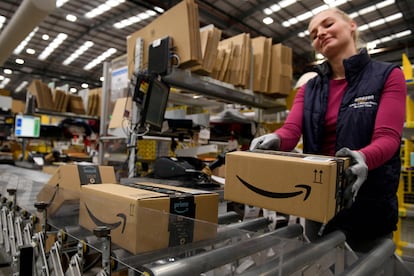A worker in one of Amazon's British warehouses DANIEL LEAL-OLIVAS / AFP
The market for fake reviews of products sold on Amazon is rampant in Telegram groups and other forums, where many sellers offer money or products in exchange for a positive opinion. Simply search Telegram for
“
Amazon
reviews
” to bring up some of these groups that operate in Spain and that organize and encourage the publication of paid reviews. Marketing that was exposed in its crudest form with the recent leak of a network of between 200,000 and 250,000 users who published false opinions on the platform.
The volume of the uncovered network can be impressive, but it can be the tip of the iceberg of a practice that has been rooted in Amazon for many years, with constant changes in its form of organization. "Now there are Telegram groups for receiving products," says Fernando Muñoz, digital marketing consultant and partner in the Raíz Digital group. This channel is the preferred one for this market, although there are also WhatsApp groups or forums on the internet. “You enter these groups and there is someone there who offers a certain product. They ask you to buy it, receive it and make a
positive
review
(review). Then they make the deposit through PayPal or another method that is not a conventional bank transfer ”, he explains.
These sellers, who use Amazon as a sales platform, usually pay the price that the product has cost - usually around $ 15 or $ 20 - which is also left to the reviewer.
Muñoz is resounding when asked if this is a common practice in Spain: “There are a lot of people doing it.
There are not so many companies that sell you the service, but there are many Spaniards buying and reviewing this way ”.
More information
Uncovered a network of 200,000 people who published fake reviews on Amazon in exchange for free products
Postman Shouldn't Call Twice: How Much Failed Shipments Cost and Contaminate
The problem is long overdue. It was already aired in a 2011 article in
The New York Times
. In it were several examples of people who earned five or 10 dollars (from 4.12 to 8.24 euros) for false opinion. And over time it has been systematized. Just a few months ago, UK consumer advocacy group Which ?, accused 10 sites of selling “review packages” to Amazon sellers. They offered to publish from 50 valuations for 620 pounds (720 euros) to 1,000 for 8,000 pounds (9,300 euros).
The Amazon review mechanism is designed so that the market can judge the quality of the products for itself. The honest opinions of users, who have nothing to gain or lose by saying something positive or making a criticism, serve to inform other users in their purchase decision. The problem comes when actors with an economic interest sneak into this gear. Because these opinions have an impact on sales.
“They influence in a very remarkable way.
They influence the consumer's own behavior and decision, ”says Enrique García López, from the OCU's Department of Communication and Institutional Relations.
And it refers to a study published by its organization in November 2020. It reflects that the vast majority of buyers consult the valuations, while 41% affirmed that they have a great influence when buying electronic products.
It is not the only value that these opinions have.
“Reviews can place the product in searches done on Amazon.
And this is almost more important than the influence itself on the purchase decision, because it can distort the competition ”, highlights García López.
Perfect gear
The springs for requesting and posting fake reviews are greased. "They have it super-automated," says Muñoz. "False review campaigns are usually accompanied by a price reduction so that it does not sing as much." The digital marketing specialist explains that this is how it is difficult for Amazon to detect that a lot of product has been bought irregularly, because it is normal for this to happen when the price is reduced.
In the list of the Spanish profiles with the most reviews on Amazon, there are users who have 2,000 reviews, 1,800 reviews and even more than 3,000 reviews. Something that is unfeasible for any average buyer. Muñoz sees in this an indicator of the professionalization of this underworld. “They usually ask you for your buyer profile to see all the
reviews
you have made. And here there are real professionals, people who are dedicated to this, even companies that have dozens of false profiles, who make many reviews of a product and then sell them on other platforms ”.
The digital marketing consultant illustrates this with an example: “Imagine that you have a computer store in the neighborhood and you have 100 Amazon profiles, which you feed based on this type of thing.
A manufacturer of
pen drives
asks for reviews.
You buy 100
pendrives
.
They pay you, with what you get free, and then you sell them in your store ”.
The dimensions of the problem
The phenomenon exists, but it is not easy to understand how far it goes.
"It is a problem that affects all electronic commerce, not just Amazon," says a spokesman for Amazon Spain.
And he adds: "We always say that we do not care whether the reviews are positive or negative as long as they are authentic and relevant."
Company policy expressly prohibits financial compensation for reviewing. To detect these cases, Amazon follows a prevention strategy, based on machine learning and teams of specialized researchers. But there is also punishment. Faced with the scandal of the uncovered network of more than 200,000 users who made paid reviews, the platform has expelled a series of sellers, including some relatively well-known such as Aukey or MPow.
From the company they emphasize that "the proportion of reviews that are false or problematic is a very small problem in Amazon, compared to the general volume."
The OCU thinks differently.
García López affirms that it is an important problem and, furthermore, widespread.
Another study carried out by the organization determined that 8.4% of the products examined were contaminated by opinions considered suspicious.
David Proserpio, an assistant professor at the University of Southern California who studied the fake review market in 2019, agreed that the problem is huge.
He analyzed groups of 16,000 people on average, and they posted more than 500 paid opinion requests per day.
"We believe that the problem has grown to the extent that until now the company had not been firm," says García López, although he acknowledges that in the latter case the technology has been forceful, with the expulsion of the brands from its platform . "Until now Amazon tried to control users who issued those opinions, but now it seems that it has acted against those certain sellers who seek formulas to gain false opinions."
The spokesperson for Amazon Spain says that they collaborate with social networks to monitor groups that ask for reviews: “We report what we see and detect.
They inform us of what they detect and they are regularly cleaning groups and messages ”.
Although the company recognizes that this task is complicated because the actors involved are looking for new formulas to continue with their activity.
Regarding buyers with an unusually high number of reviews, more than 1,000 or 2,000, the Amazon spokesperson indicates that there are some very active reviewers, those within the Amazon Vine program.
It offers free products to some users for them to post their review.
They are not paid opinions, although users keep the product.
The e-commerce giant believes that the most effective way to fight false reviews is the dissemination of the consequences: “They are actors who have an economic interest in selling on Amazon.
Some actions that can lead to the suspension of an account can be a waste of a lot of money.
And that factor can have weight if it is seen that we and other companies take this issue very seriously. "
You can follow EL PAÍS TECNOLOGÍA on
and
.


/cloudfront-eu-central-1.images.arcpublishing.com/prisa/4N3PH4ENIIHT3JOWUNLFYIAHMU.jpg)










